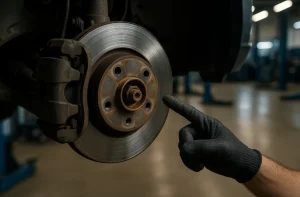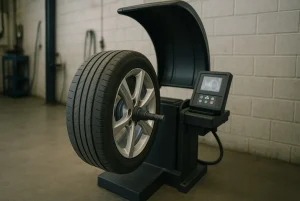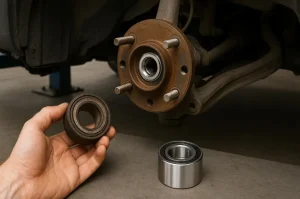Have you ever pressed the brake pedal and felt your steering wheel begin to tremble in your hands? For many drivers across the UK, this unnerving sensation is not only uncomfortable but also a potential sign of a serious fault.
A shaking steering wheel when braking is never something to ignore, as it can point to issues with the braking system, tyres, suspension, or even wheel bearings. But what exactly causes this problem, and how can it be fixed?
What Are the Most Common Brake Problems Behind Steering Wheel Shaking?
The braking system is the first place to investigate when the steering wheel vibrates during braking. Brakes are subjected to high levels of heat and friction, and even small irregularities can translate into noticeable shaking.
Warped Brake Rotors

One of the most frequent causes is warped brake rotors. Brake rotors, also known as discs, are large metal plates clamped by the brake pads to slow the vehicle down.
Over time, particularly under heavy use such as motorway driving or stop-start city traffic, these discs can become uneven due to heat expansion.
When they cool unevenly, they no longer rotate with a perfectly flat surface. The brake pads then press against this distorted surface, creating vibrations that are transferred through the steering column.
Imagine the sensation of driving over an uneven road surface; this is similar to what happens when warped rotors interfere with smooth braking.
The vibration is often more pronounced at higher speeds or when braking downhill, when more pressure is applied to the braking system.
Worn or Contaminated Brake Pads

Brake pads are designed to wear down over time, but if they wear unevenly, they may apply inconsistent pressure to the rotor.
In other cases, pads can become contaminated with oil, rust, or debris, reducing their ability to grip the disc evenly. This uneven contact produces shaking that is felt directly in the steering wheel.
Stuck Brake Calipers

Another culprit is a sticking brake caliper. Calipers are responsible for pressing the pads against the discs. If one seizes, it may not release properly or may apply uneven force.
This creates an imbalance between the wheels, which the driver feels as vibration or even a pulling motion to one side when braking. Left unresolved, this can lead to accelerated wear on both pads and discs.
Could Tyres or Wheels Be Causing the Steering Wheel to Shake?
While brakes are often to blame, the tyres and wheels can also play a significant role in steering wheel vibration.
Unbalanced or Worn Tyres

Unbalanced tyres are a very common cause of vibration. When a wheel is not properly balanced, it does not rotate evenly.
At higher speeds, this imbalance is magnified, and the additional strain of braking can make the steering wheel shake even more noticeably. Similarly, tyres that are worn unevenly or have flat spots can disrupt smooth braking.
For example, a driver who has not rotated their tyres for several years may develop uneven tread wear. When braking, the uneven surface increases pressure on certain areas of the wheel, leading to steering wheel vibration.
Worn Wheel Bearings

Wheel bearings allow the wheels to rotate smoothly. If they wear out or become loose, the wheel may wobble slightly as it turns. This movement can affect the rotor’s stability and create a vibration when braking.
Drivers often notice additional symptoms, such as a low humming or grinding noise while driving, before the vibration becomes apparent.
Can Suspension Problems Cause the Steering Wheel to Shake?
Yes, suspension problems are another possible cause of a shaking steering wheel under braking. The suspension system connects the wheels to the vehicle’s body and keeps the car stable.
If parts such as ball joints, tie rods, or control arm bushings wear out, they can no longer hold the wheels firmly in place.
During braking, much of the vehicle’s weight shifts forward, placing extra stress on these components. If they are already loose or damaged, the result can be steering wheel vibration.
Drivers often find that the problem grows worse at higher speeds, as the worn suspension parts are unable to maintain stability under pressure.
How Can Drivers Tell Whether It’s a Brake Problem or Something Else?
Distinguishing between brake-related issues and other mechanical problems can be difficult without a professional inspection, but there are some signs drivers can look for.
If the vibration only happens when pressing the brake pedal, it is highly likely to be a brake-related issue, such as warped rotors, worn pads, or a seized caliper.
This vibration may be accompanied by a pulsing sensation in the brake pedal itself. On close inspection, brake discs may show visible grooves or heat spots, further confirming the issue.
On the other hand, if the steering wheel shakes even when not braking, the problem may be linked to tyres, wheel balance, or suspension.
Uneven tyre wear, bulges, or unusual noises while driving over bumps are common signs that the suspension or wheels are responsible rather than the braking system.
What Should Drivers Do When Their Steering Wheel Shakes Under Braking?
The first step is to book the car in with a qualified mechanic as soon as possible. Because both the brakes and steering are vital safety components, any fault affecting them poses a significant risk.
When speaking with a mechanic, it is important to describe the symptoms clearly. Mentioning that the shaking occurs only under braking, whether it is worse at high speeds, or whether the car pulls to one side, will help the mechanic narrow down the likely causes quickly.
Depending on the diagnosis, repairs might include resurfacing or replacing brake rotors, fitting new pads, replacing a seized caliper, balancing or aligning the wheels, repairing suspension components, or replacing worn wheel bearings.
How Much Does It Cost to Repair Steering Wheel Vibration in the UK?
Repair costs vary depending on the cause of the problem and the type of vehicle. The table below outlines common repairs and their average prices in the UK:
| Repair Type | Average UK Cost (2025) | Notes |
| Brake Disc Replacement (per axle) | £150 – £300 | Higher-end vehicles may cost more |
| Brake Pad Replacement (per axle) | £80 – £150 | Often replaced with discs |
| Brake Caliper Replacement | £200 – £400 each | Cost varies with make and model |
| Wheel Balancing | £15 – £40 per wheel | Prevents tyre-related vibrations |
| Wheel Alignment | £30 – £70 | Recommended annually |
| Suspension Repairs | £200 – £600 | Ball joints, tie rods, or bushings |
| Wheel Bearing Replacement | £180 – £350 per wheel | May require specialist tools |
How Can Drivers Prevent Steering Wheel Shaking in the Future?

Prevention is always better than cure, especially when it comes to safety-critical systems such as brakes and steering. Regular maintenance goes a long way towards avoiding steering wheel vibrations.
Brake discs and pads should be inspected routinely, with replacements carried out before they are excessively worn. T
yres should be rotated every 6,000 to 8,000 miles and balanced whenever new tyres are fitted. Maintaining the correct tyre pressure also helps prevent uneven wear.
Suspension and wheel bearings should be inspected during annual servicing to ensure that any wear is detected before it develops into a more serious problem.
Finally, driving habits make a difference: avoiding harsh braking from high speeds reduces heat build-up in rotors and extends the life of brake components.
Conclusion
A steering wheel that shakes when braking is most often linked to warped rotors, worn pads, or issues with tyres and suspension.
While the problem may begin as a mild vibration, ignoring it can quickly lead to more dangerous conditions and higher repair costs.
For UK drivers, addressing this issue promptly with the help of a qualified mechanic ensures safer journeys and prevents long-term damage to the vehicle.
FAQs on Steering Wheel Shaking When Braking
Can worn brake pads cause my steering wheel to shake?
Yes. Uneven or contaminated brake pads make irregular contact with the discs, which creates vibration in the steering wheel.
Why does my steering wheel shake more at high speeds?
Minor imperfections in rotors, tyres, or wheel balance become amplified at higher speeds, making the vibration more obvious during braking.
Can a seized brake caliper cause vibration?
Yes. If a caliper sticks, it applies uneven pressure to the discs, creating shaking and increasing wear.
How do I know if my suspension is causing the problem?
If the steering wheel shakes even without braking or clunks are heard over bumps, the suspension is likely to be at fault.
Could unbalanced tyres make my steering wheel shake when braking?
Yes. Unbalanced or unevenly worn tyres disrupt smooth rotation, and braking exaggerates this imbalance.
How urgent is it to fix this issue?
It is very urgent. Any problem affecting brakes or steering compromises road safety and can result in MOT failure.
Can wheel bearings cause vibration when braking?
Yes. Worn bearings allow rotors to move unevenly, which produces vibration during braking.






